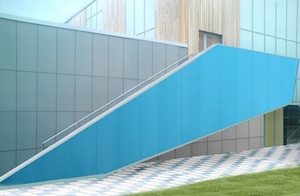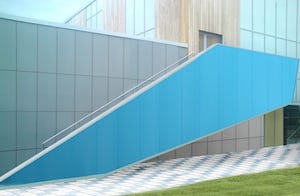Multiwall polycarbonate (PC) sheets have been on the market for more than 40 years, according to facts presented by the European Polycarbonate Sheet Extruders (EPSE; Brussels), a trade association for producers of PC sheet and extrusion technologies. Primary applications for building and construction have been in cladding, roofing, skylights, sheds, greenhouses and verandas. The material continues to find broader applications, however, because of its environmental benefits and comparative cost advantage.
January 21, 2016

 Today, most industrial buildings use this multi-purpose material, which offers what the EPSE calls a multitude of advantages in respect to its compatibility with the High Environmental Quality standard, including insulation qualities, durability and high impact resistance. The multiwall PC sheets have insulation properties that are equivalent to glass but at a lower cost, claims the EPSE.
Today, most industrial buildings use this multi-purpose material, which offers what the EPSE calls a multitude of advantages in respect to its compatibility with the High Environmental Quality standard, including insulation qualities, durability and high impact resistance. The multiwall PC sheets have insulation properties that are equivalent to glass but at a lower cost, claims the EPSE.
The EPSE noted that multiwall PC's thermal insulation coefficient can reach down to 1W/m2 K with simple panels or even lower by combining panels in double-skin systems (with an air space between the cellular polycarbonate sheets). Additionally, its low price makes a complete façade affordable.
Multiwall PC panels can be customized to meet the needs of builders, and come in a range of colors and finishes, including translucent, opaque or frosted, and can be easily integrated into an industrial structure or used as part of an interior decoration scheme. The cold bending capability makes panels a good fit for many specific requirements and makes it possible to create a particular form, which may enhance the value to an architectural design.
Since the panels can be cut to a desired length during the production process, waste from offcuts produced during on-site installation is minimized. Additionally, multiwall PC panels can be manufactured out of virgin or recycled materials. The latter, however, have to come exclusively from post-industrial waste, said the EPSE.
With its intrinsic qualities, PC is a sustainable material that has minimal impact on the environment and is fully recyclable at the end of its life, said the EPSE.
About the Author(s)
You May Also Like




